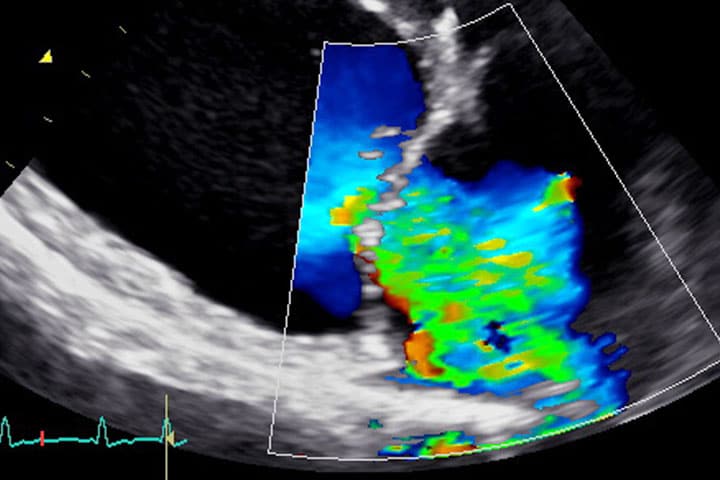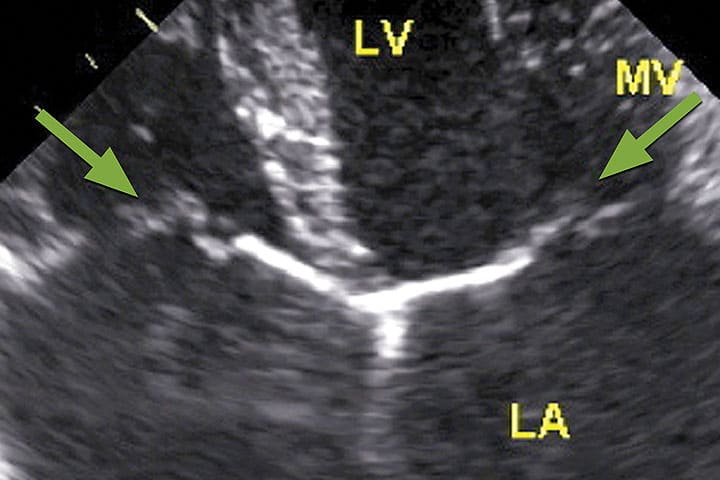
A heart murmur is an abnormal heart sound that indicates a degree of turbulence to the usually laminar blood flow in the heart. It can be physiological in athletic animals, due to congenital cardiac conditions in young patients or caused by non-cardiac condition affecting the way blood flows (anaemia, fever, high cardiac output states, etc) but in an adult dog it is often an indication of heart disease.
Murmurs are often graded as ‘soft’ if their intensity is lower than the normal (S1/S2 or ‘lub’/‘dub’) heart sounds, ‘moderate’ if they have a similar intensity, ‘severe’ if they are louder and ‘thrilling’ if the murmur is palpable.
It is important to remember that the intensity of a murmur generally correlates to the severity of the underlying condition with the exception of a few congenital conditions. In large breeds, dilated cardiomyopathy (DCM) is often the underlying condition with the murmur resulting from mitral annulus distension whilst in small breeds, degenerative mitral valve disease (MVD) leads to valvular regurgitation (murmur) by progressive thickening of the valve leaflets.
These diseases are progressive and a murmur is often the first clinical sign. With progression of these conditions, the heart suffers a process of remodelling with enlargement of cardiac chambers. This stages are called ‘occult DCM’ and ‘stage B2 of MVD’ and clinical signs are often absent. Ultimately these conditions will progress to heart failure (‘over DCM’ and ‘stage C of MVD’) and therapy is then imperative to control clinical signs (exercise intolerance, tachypnoea and dyspnoea), improve quality of life and prolong survival.
Until recently, therapy for these condition was limited to this more advanced stage (congestive heart failure) and therefore the clinical focus was placed on the associated clinical signs and not on the presence or intensity of the murmur.
Recent published evidence (PROTECT and EPIC studies) have highlighted the role of early therapy with Pimobendan for both of these conditions, showing that this early therapeutic intervention (when there is evidence of significant cardiac remodelling), can substantially delay the onset of congestive heart failure (9 months for the DCM cases and 15 months for the MVD patients) prolonging the ‘symptom free stages of the disease’.1,2 These findings have brought the relevance of early disease detection to the forefront of clinical management strategies.
The appropriate staging of these condition is based on a complete echocardiographic evaluation but clinical suspicion should be raised when a murmur is noted on a large breed dog or a loud/progressing murmur is present in a small breed suspected to have MVD.
Top tips:
Murmur in a large breed dog
- Suspect dilated cardiomyopathy if no other cause for the murmur is present (anaemia, fever, etc.)
- Confirm or rule out with echocardiography the presence of occult DCM (chamber dimensions above reference range and impaired systolic function)
- Start therapy with Pimobendan if occult DCM is confirmed
Murmur in a small breed dog
- Suspect mitral valve disease if no other cause for the murmur is present
- Soft murmurs (lower intensity than the normal heart sounds) are often indicative of early disease and unlikely to be associated with cardiac remodelling
- Loud murmur (higher intensity than the normal heart sounds) or progression of murmur intensity are indicative of advanced disease and may be associated with cardiac remodelling
- Confirm or rule out with echocardiography the presence of stage B2 MVD (mitral valve degeneration and chamber dimensions above reference range)
- Start therapy with Pimobendan if Stage B2 is confirmed
1 Summerfield, N. J. et al. Efficacy of Pimobendan in the Prevention of Congestive Heart Failure or Sudden Death in Doberman Pinschers with Preclinical Dilated Cardiomyopathy (The PROTECT Study). J. Vet. Intern. Med. 26, 1337–1349 (2012).
2 Boswood, A. et al. Effect of Pimobendan in Dogs with Preclinical Myxomatous Mitral Valve Disease and Cardiomegaly: The EPIC Study—A Randomized Clinical Trial. J. Vet. Intern. Med. 30, 1765–1779 (2016).


Case Advice or Arranging a Referral
If you are a veterinary professional and would like to discuss a case with one of our team, or require pre-referral advice about a patient, please call 01883 741449. Alternatively, to refer a case, please use the online referral form
About The Discipline
Cardiology

Need case advice or have any questions?
If you have any questions or would like advice on a case please call our dedicated vet line on 01883 741449 and ask to speak to one of our Cardiology team.
Advice is freely available, even if the case cannot be referred.